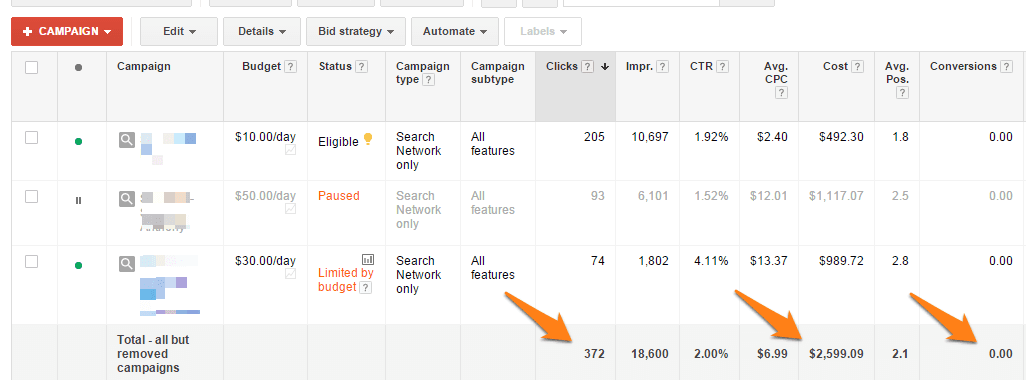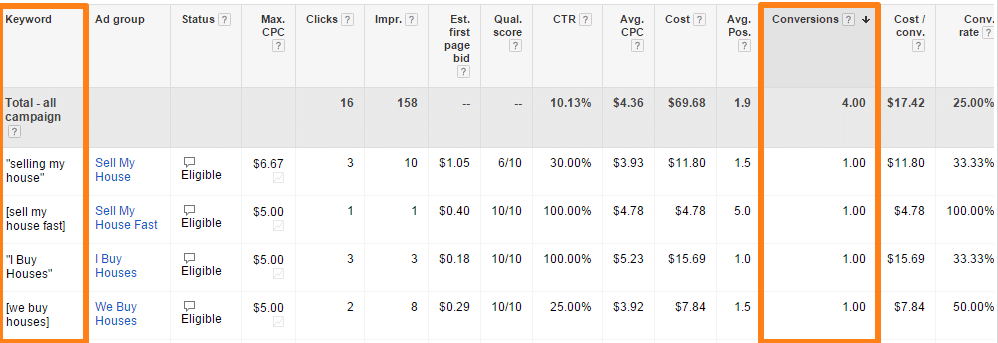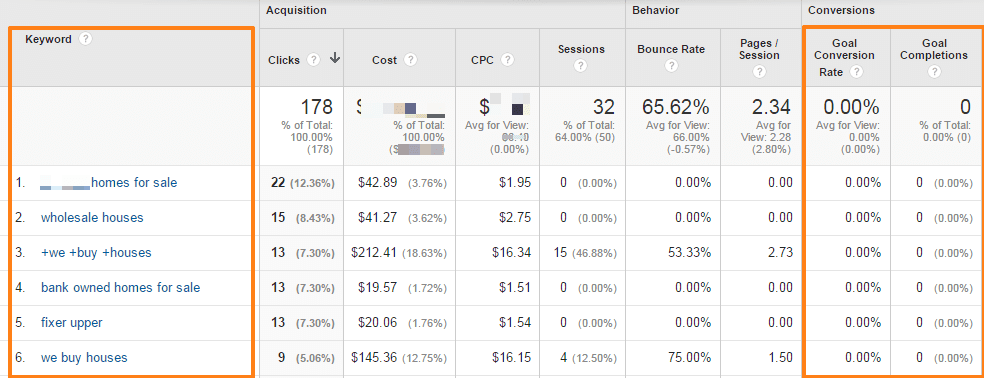
A client of ours reached out and had dropped $5,000 in Google Ads costs over a few months on a campaign he was managing himself, but it wasn’t performing as he hoped, and he had no clue what parts of his PPC marketing were working and what factors were costing him money.

Ready To Get More Leads & Close Your Next Deal? Take Your Business To The Next Level
Join the next ChallengeIn this post, we’ll walk you through the simple action we had him take that turned things around from $5k in losses to over $30k in profits… and the #1 mistake most newbie PPC marketers make that prevents you from knowing if your PPC marketing is working for your real estate investing business.
I get asked this question all of the time…
“How do I know which keywords and ads are generating leads?“
Here’s my answer: if you don’t have the proper recording sources and/or analytic tools, you won’t know. Google Ads campaigns will become a frustrating guessing game that may drain your budget.
I also hear that Google Ads is an expensive waste of time and won’t generate leads. That may be true… if campaigns are not created using an optimized campaign structure. If your PPC campaign is optimized, chances are you’ll be in the right position to be successful.
PPC management can test the skills and patience of even the most experienced ad managers. You may be thinking, “My campaign is doing OK right now,”
But if you take a deeper look…
- Is it as effective as it can be?
- Is it efficient and structured in a way that isn’t confusing?
- Are you continuously enhancing your return on ad spend?
- Are you data-tracking keywords and ads?
Without proper data tracking, knowing if your PPC campaign is working won’t be easy.
Unlocking Profitability: 3 Powerful Tactics to Determine the Success and Failure of Your PPC Marketing Ads and Keywords
Is PPC Good For My Real Estate Investor Business?
How do you know? Here are a few ways to track your conversions so you know that your money is being invested wisely and not just thrown down into a black hole.
PPC Tracking Tactic #1: Google Ads (Conversion Tag)
The BEST WAY.
A no-brainer is to set up your campaign using the Google Ads conversion tag. Without implementing this tag on your site, you’re measuring keyword and ad effectiveness with a gut feeling.
You or your account manager must know how a searcher landed on your site and what happened after they clicked on your ad. Did they fill in your lead form? Which keyword, ad, and/or ad group triggered the conversion? Those questions will help you build and maintain a quality Google Ads campaign.
Here’s an example of a Google Ads campaign that does not use the Google Ads conversion tracking tag. It’s not that the Investor chooses not to because they choose to use a different company to host their website. This “other” web service prevents them from placing a conversion tag on their site. Carrot real estate investor websites are built with the high-achieving investor in mind, making it crazy easy to add your conversion tracking tags.
You can see there has been $2599 spent on 372 clicks and 0 conversions.
But… that’s not true. There have been 48 conversions (this Investor keeps track of conversions using their system)… $54 per motivated house seller lead! Not too shabby. But an account manager would have no idea which keywords have to lead to those 48 leads. We’re blindly leading the ship.
A Google PPC Campaign Without Conversion Tracking = Throwing Darts Blindfolded

This is what a campaign’s keywords should look like when the Google Ads conversion tag is properly implemented. An account manager knows exactly what keywords need to be adjusted and tested.
A Google PPC Campaign Using Conversion Tracking = Strategic ROI-Based Marketing

The benefits of recording data — you will know which ads, placements, and keywords lead to conversions and are worth bidding on. You’ll also know the reverse, which ad, placements, and keywords to pause.
Pros and Cons Of This Tracking Method:
- Pro: Helps you find exactly which ads, keywords, and ad groups are performing the best and worst so you can make smart decisions to drive up your return on investment
- Con: Nothing… really. This method is highly recommended as long as your tag is installed correctly on your website and you record unique leads.
Be sure to create a conversion tracking tag for your PPC leads.
For Carrot members, you can place a conversion tracking tag on your “step-2” page to ensure tracking on all potential clients who have filled out one of your website forms. Tags allow you to definitively know when traffic has come from your PPC campaign rather than from SEO, direct mail, etc… it also helps you drill down on exactly which keywords are producing profitable leads and which aren’t.
You can use the Google Tag Assistant to double check the tag is reading your step-2 page.
HOW CARROT MEMBERS CAN PLACE AN ADWORDS CONVERSION TAG ON THEIR CARROT SITE

PPC Tracking Tactic #2: Google Analytics
First… you’ll need to link your Google Ads account to your Google Analytics. While you will be able to track conversions in Analytics, you won’t be able to know for sure which keyword or ad generated the click. This isn’t the best way to monitor the performance of your PPC campaign but it can be used to track overall lead volume.

Pros and Cons Of This Tracking Method:
- Pro: Gives you great aggregate data on the performance of your Adwords campaigns
- Con: It doesn’t let you drill down too far into specific ads or, in some cases, specific keywords either, and doesn’t tell you exactly which leads came from where.
PPC Tracking Tactic #3: The Carrot Lead Source Feature
Like the information in Analytics, Carrot members can see which traffic source generated the lead, but again not a specific ad or keyword.
The Lead Source Tracking is automatically tracked for every single lead that comes into an InvestorCarrot site You don’t have to do anything to turn it on. Just head to view your leads, and it’s right there.
To find this info, log in to your Carrot site and view your leads. We’re currently working on a massive upgrade that will give more power and functionality to Campaign Tracking within your InvestorCarrot site. Keep an eye out for that release this spring!
Carrot Lead Source Tracking Built Right Into All Of Our Websites

Pros and Cons Of This Tracking Method:
- Pro: This Lets you see exactly where each lead came from so you can track the true profitability of your marketing. This, combined with the Google Ads Conversion Tracking tag, is the ideal setup to give you the whole picture.
- Con: This tracking doesn’t give you any data about the ad that drove the lead.
Key Strategies for Running a High-Quality Campaign and Positioning Your Ads for Maximum Impact
To measure the effectiveness of your advertising campaign, you should monitor your investor transactions, whether buyer or seller, and keep track of new customers, requests for information leads, phone inquiries, and even organic website traffic.
Here are some ideas that will help you not only determine the effectiveness of your ads but will also give you some new marketing ideas.
Additional PPC Marketing Optimization Tips
1. Compare your sales before, during, and after your ad campaign.
Keep in mind that internet advertising often has a delayed affect and can then grow steadily.
Transactions that result from your ads may not take place immediately. So be patient.
2. Use a dedicated phone number to track inquiries.
Create a phone call conversion tag for AdWords or other internet marketing options. Tags make it easy to identify and track phone leads positively.
3. Here are several more that will help squeeze out that extra profit and return on investment…
- Set a PPC goal. This could be the number of leads per week, month, or even a cost-per-lead target amount. Whatever it is, though, write it down and constantly measure it.
- Keep your campaign organized. A messy campaign can cause confusion, waste spending, and ultimately leave you unmotivated.
- Target the right keywords and limit the number of keywords. Yes, you can have too many. The sound of 4,000 keywords might sound appealing. However, having too many keywords can lead to confusion and harm your campaign. Unless you are willing to create ad groups and ad text based around each keyword, AdWords potentially won’t give you a high enough quality score for ads to show in the highly regarded top three ad spots (41% of clicks come from the top 3 spots). You can also waste spending due to higher click costs and possible clicks from unrelated searchers.
- Creating compelling ad copy. Make a searcher want to click your ad. Read our blog post here, where we write about that.
- Testing…testing. Create numerous ads and be sure to test them to figure out which ones are more attractive. Even minor changes, such as removing or adding a word in the ad headline, can make all the difference.
- Use quality landing pages. Landing page experience refers to the relevant, helpful, and original content. Read this post to learn how city-specific landing pages help you get more traffic.
Landing pages must offer trustworthiness and be easy for customers to navigate. It also requires a quick loading page time and encourages customers to spend time on your site. - Make sure your call to action is clear. Tell the searcher what to do. Don’t make them guess.
- Put the focus on your potential motivated seller or buyer lead. Let them know why you’re better than the competition.
- Always implement a conversion tracking tag. Yes, you might be able to track lead sources, but if you look at your Google Ads account, you won’t know which keywords and ads generate ROI. It will become a guessing game as to which keywords to pause potentially and which to be more aggressive with.
Reasons Why You Should Start Conversion Tracking Today
You must start to gain insight into what’s working within your campaign. Without that knowledge, your Google Ads campaign won’t be completely optimized. This will limit you from being able to make the necessary changes to attract more leads.
You’ll also be able to improve your ROI.
Clicks are not valuable unless they are converting into leads that turn into profitable deals over time.
Tracking will reduce wasted ad spend, gain quality clicks, and improve ROI.
With the data gathered from tracking, you can perform a better test on your campaigns and grow them to get even more conversions.
Don’t Spend Another Dime On PPC If You Don’t Have Layers Of Conversion Tracking In Place
Once our client turned on conversion tracking, he could quickly see which ads and keywords were a complete waste of money and which were bringing him solid leads. He trimmed off the stuff that wasn’t effective and ramped up the stuff that was. Within four months, he closed several deals that have brought in over $30,000.
He possibly would have closed those deals without the tracking in place, but his profit would be far less because of the wasted marketing dollars he was spending before he had tracking in place.
Tracking is essential… not just a “luxury.”
Implement the Google Conversion Tag + make sure you’re using a website system that helps track your leads and tell you where each lead came from. That information alone could save you tens of thousands of dollars per year.
There are a lot of factors, including time of the year, the state of the economy, and geographic location, which can make it difficult to accurately measure the success of your ads if you don’t use the proper tracking techniques.
Compare the before and after advertising traffic from your Carrot website. Also, your PPC manager should be able to provide you with weekly and/or monthly PPC reports.
You can also be proactive. When talking with your leads, don’t forget to ask them the obvious question.
How did they find your website?
PPC might not be a cost-effective alternative in very competitive markets unless you can ensure a large enough marketing budget or be willing to limit your traffic if you’re using Bing… but either way… putting in place what you learned in this blog post is essential in competitive markets. Let your PPC be a great compliment to your SEO campaign.
PPC data tracking is one of the most important parts of your PPC campaign.
Interested in switching to Carrot so you can take hold of your online marketing once and for all and ramp up your ROI? Awesome! Take a demo and reach out if you have any questions!

Great stuff, nice to see some PPC articles. Adwords mostly I wouldnt do bing unless you got money to blow lol.
Elpen! Man, you’d be surprised about Bing… we generate leads and clients through Bing on a consistent basis. The lead volume is much lower… but if you spend a bit of time to get your bing campaign launched and refined… sometimes you can let it run and set your budget low. Don’t discount it… there are leads in there.
I just started a PPC campaign managed by a specialist. Having just started, what is my metric to determine the success of this marketing campaign? I know it takes time to get dialed in, but my only metric is leads and lead quality. They, however, are hesitant to talk about number of leads as a metric because they don’t want to be in a position to guarantee leads. So that creates a wierd dynamic.
Hey Travis,
This is a good question. Over the long run, the success of the marketing campaign will be solved by the volume of deals/profits and the costs. Right now, in the early stages, yes, you want to consider the number of leads and the quality, but also keeping an eye on the keywords/costs that are driving those leads. In this early “research” phase, there can be keywords that will take time to weed out. That weeding out period could take a month or two so there is a time for patience. I know that can be a tough time for sure.
For that dynamic, yeah, I can see that is a difficult situation. There are so many variables that can factor into the lead volume and that makes it tough. What might be possible is to get a rough estimate of a like market with a similar campaign structure. If that would help you.
If it helps crunching numbers, check out our ROI Calculator https://oncarrot.com/resources/roi/